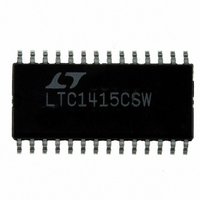LTC1415CSW#PBF Linear Technology, LTC1415CSW#PBF Datasheet - Page 9

LTC1415CSW#PBF
Manufacturer Part Number
LTC1415CSW#PBF
Description
IC A/D CONV 12BIT SAMPLNG 28SOIC
Manufacturer
Linear Technology
Datasheet
1.LTC1415CSWPBF.pdf
(24 pages)
Specifications of LTC1415CSW#PBF
Number Of Bits
12
Sampling Rate (per Second)
1.25M
Data Interface
Parallel
Number Of Converters
1
Power Dissipation (max)
100mW
Voltage Supply Source
Single Supply
Operating Temperature
0°C ~ 70°C
Mounting Type
Surface Mount
Package / Case
28-SOIC (0.300", 7.50mm Width)
Number Of Elements
1
Resolution
12Bit
Architecture
SAR
Sample Rate
1.25MSPS
Input Polarity
Unipolar
Input Type
Voltage
Rated Input Volt
4.096V
Differential Input
Yes
Power Supply Requirement
Analog and Digital
Single Supply Voltage (typ)
5V
Single Supply Voltage (min)
4.75V
Single Supply Voltage (max)
5.25V
Dual Supply Voltage (typ)
Not RequiredV
Dual Supply Voltage (min)
Not RequiredV
Dual Supply Voltage (max)
Not RequiredV
Power Dissipation
100mW
Differential Linearity Error
±1LSB
Integral Nonlinearity Error
±1LSB
Operating Temp Range
0C to 70C
Operating Temperature Classification
Commercial
Mounting
Surface Mount
Pin Count
28
Package Type
SOIC W
Lead Free Status / RoHS Status
Lead free / RoHS Compliant
Available stocks
Company
Part Number
Manufacturer
Quantity
Price
APPLICATIONS
Effective Number of Bits
The effective number of bits (ENOBs) is a measurement of
the resolution of an ADC and is directly related to the
S/(N + D) by the equation:
where N is the effective number of bits of resolution and
S/(N + D) is expressed in dB. At the maximum sampling
rate of 1.25MHz the LTC1415 maintains very good ENOBs
up to the Nyquist input frequency of 625kHz (refer to
Figure 3).
Total Harmonic Distortion
Total Harmonic Distortion (THD) is the ratio of the RMS
sum of all harmonics of the input signal to the fundamental
itself. The out-of-band harmonics alias into the frequency
N = [S/(N + D) – 1.76]/6.02
Figure 3. Effective Bits and Signal/(Noise +
Distortion) vs Input Frequency
12
11
10
9
8
7
6
5
4
3
2
1
0
1k
U
INPUT FREQUENCY (Hz)
10k
–100
–120
–20
–40
–60
–80
0
INFORMATION
0
U
fb – fa
100k
2fa – fb
W
100k
LT1415 • F03
1M 2M
Figure 5. Intermodulation Distortion Plot
2fb – fa
2fa
74
68
62
56
200k
U
fa + fb
2fb
3fa
FREQUENCY (Hz)
fa + 2fb
2fa + fb
300k
band between DC and half the sampling frequency. THD is
expressed as:
where V1 is the RMS amplitude of the fundamental fre-
quency and V2 through Vn are the amplitudes of the
second through nth harmonics. THD vs input frequency is
shown in Figure 4. The LTC1415 has good distortion
performance up to the Nyquist frequency and beyond.
Intermodulation Distortion
If the ADC input signal consists of more than one spectral
component, the ADC transfer function nonlinearity can
produce intermodulation distortion (IMD) in addition to
THD. IMD is the change in one sinusoidal input caused by
3fb
THD
400k
–100
20
–10
–20
–30
–40
–50
–60
–70
–80
–90
Figure 4. Distortion vs Input Frequency
0
Log
1k
f
f
f
SAMPLE
IN1
IN2
= 86.97509766kHz
= 113.2202148kHz
V
500k
2
INPUT FREQUENCY (Hz)
= 1.25MHz
10k
2
V
LTC1415 • F05
3
2
100k
600k
V
1
V
4
2
3RD
THD
2ND
LTC1415 • F04
1M 2M
LTC1415
Vn
2
9














